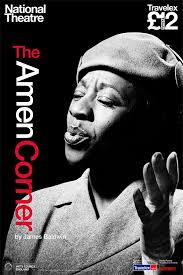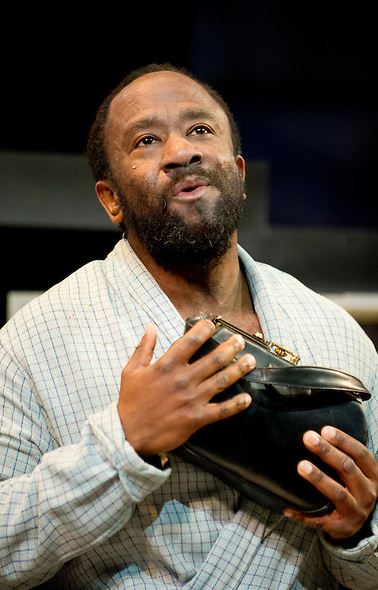 A few weeks ago Owen and I went to Church. Oh, and we went to New York. The difficult part was that we also went back 60 years to 1953. But the Olivier Theatre has always served me well as a time machine. It was all so we could witness the goings on at a storefront church which is where James Baldwin's THE AMEN CORNER takes place.
A few weeks ago Owen and I went to Church. Oh, and we went to New York. The difficult part was that we also went back 60 years to 1953. But the Olivier Theatre has always served me well as a time machine. It was all so we could witness the goings on at a storefront church which is where James Baldwin's THE AMEN CORNER takes place. Baldwin had grown up in the abusive home of his preacher stepfather. He became a preacher himself at the age of 14 until three years later when he became disenchanted with religious life, around the time he also discovered his gay sexuality. At the age of 29, after living in Paris, he wrote GO TELL IT ON THE MOUNTAIN, a semi-autobiographical first novel set in the Pentecostal community but, still not exorcised, the following year he wrote his first play THE AMEN CORNER.
The play is a rarity in that it features four excellent larger-than-life female characters who power the play alongside three lesser male roles. Rather shockingly, the play has only had one Broadway production, a two month run in 1965. In London it had a notable premiere in 1987 at the Tricycle Theatre which transferred to the West End and now it is being presented in the largest auditorium at the National Theatre.
Margaret Alexander is a self-made woman, a woman who has raised her son David single-handed and become the preacher at a small storefront church while she, her son and her devoted sister Odessa all live in the small apartment on the premises. Although she is deeply loved by her congregation they are also cowed by her God-fearing teaching and way of life which means that she is immovable in her fierce belief that God's is the only way.
For example, Brother Boxer comes to Margaret and says that he has been offered a job driving a beer truck which will earn him more money. But no, Margaret rules from on high that to take the job would be Godless as it's propagating the sale of the demon drink. The best the aggrieved parishioners can hope for is that the more easy-going Odessa will try to convince her hard-line sister.
But in true Greek Drama style, just as Margaret is achieving great things in hooking up with a bigger church in a different state, her life is rocked when her dissolute husband Luke appears from out of her past. Luke is in a very bad physical state and cannot be moved so it allows David to finally get to know his musician father, just as he is feeling the pull away from the church to jazz clubs.
While this is taking place downstairs, Margaret is facing growing dissent in the church as questions are being asked, such as where the new fridge came from in her kitchen just after the parishioners had financed her trip to the affiliated church. This Crimplene & big hat rebellion is led by sweet-talking, steel-eyed Sister Moore who is given extra fuel when Luke tells everyone that the truth is that Margaret left him, he never left her.
Baldwin certainly created interesting characters who hold your attention and are bold, decisive figures. Sadly his dialogue doesn't match up to these characters and his scenes can sometimes go over the same ground too many times which can be a little wearying especially if it is between just two characters. The pay-off is also rather obvious and the denouement, after all the plotting that has gone before, seems oddly rushed.
Rufus Norris has directed the play well with the action motoring along despite the treading-water quality to some of Baldwin's two-hander scenes. I was surprised when it was announced that the production was going into the Olivier as the play would fit perfectly into the 'normality' of the Lyttleton but actually I applaud that choice as I suspect within the proscenium arch the whole enterprise would have felt stifled. Ian MacNeil's set design angles the action so it is close to the audience and it certainly helps open the play out from what could be quite a claustrophobic piece.
What Norris has also done is elicited excellent performances from his cast of fine performers. As I said earlier, Baldwin has written four stonking roles for women and here they are grabbed with huge gusto by four formidable performers.
Marianne Jean-Baptiste has lived and worked in Los Angeles since 2002 after finding little progression in the roles offered to her here after being the first black Briton nominated for an Academy Award in SECRETS AND LIES. Her performance as the righteous Margaret shows us all how much we have been missing.
It's a very hard role: although loving to her family, Margaret is a brick wall who will not be breached. It is hard to feel sympathy for the character but at the end - when Margaret realises that love is the way to true spirituality - it is important that the actress can touch you and this is exactly what Jean-Baptiste achieved. Throughout the second act you could almost see her carapace being chipped away piece by piece until, confronted by the collapse of all her dreams, she is left alone but more at peace. It's a rare actress that can hold an audience's sympathy off until she needs to let it be released but Marianne Jean-Baptiste managed it with a consummate ease. It's a crime that she was not given the opportunities before.
As Margaret's more forgiving but equally loyal sister Odessa, Sharon D. Clarke was a revelation too. I am used to seeing her in musical roles but here she gave us a portrait of a woman who has put her on life on hold to support her more ambitious sister and her nephew. Another actress who I have also only usually seen in featured musical roles is Jacqui Boatswain who here gave a delightfully slippery performance as Sister Boxer, smarting from Margaret's refusing her husband to take a well-paid job and biding her time until she could help bring her down.
But despite these excellent performances, there was yet one more performer who not only stole every scene she was in but also went through all of our pockets and took the bulbs out of the lights too. Cecilia Noble was just astonishing as Sister Moore, a baby-voiced Judas and an outsized Brutus, dissembling sweetly while she orchestrated Margaret's downfall only to let the mask fall at the end with a hollered "Victory!" as she moves to centre-stage. It was an audaciously funny but truthful performance that lingered long in the memory.
I would also like to mention Naana Agyei-Ampadu as Ida, a nervous young woman who comes to Margaret for help over her sick child in the first act only to appear again in the second act - just as Margaret is starting to doubt her own rigid beliefs - in a state of suicidal distress now her child is dead. It was a performance that had to go from 0 to 100 in as many minutes and she handled it with a raw power.
The three men's roles really are just supporting parts but I enjoyed Donovan F. Blackwood as the boisterous Brother Boxer, Eric Kofi Abrefa as the conflicted son David and Lucian Msamati was a shaky livewire as the dying ex-husband Luke. Among the supporting cast, augmented with members of London Community Gospel Choir, who raised the Olivier roof with their Church singing were Delroy Atkinson (from Ray Davies' musical COME DANCING) and Miquel Brown (Hi-NRG Queen and Sinitta's mum!)








No comments:
Post a Comment